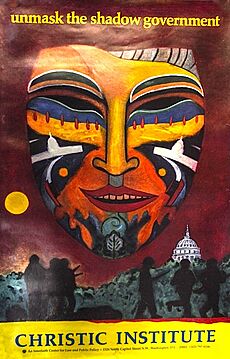Romero Institute facts for kids
| Mission | The Institute uses a combination of public education, community organizing, and legal action to bring about structural change to address the issues that threaten our human family. |
|---|---|
| President | Daniel Sheehan |
| Head | Sara Nelson |
| Location |
Santa Cruz, California
|
| Website | RomeroInstitute.org |
The Romero Institute is a group in Santa Cruz, California, that works for justice and public good. It helps people through education, community work, and legal actions. The institute is named after Óscar Arnulfo Romero, a respected Archbishop from El Salvador.
The Romero Institute has three main projects: the Lakota People's Law Project, The New Paradigm Institute, and Greenpower.
Contents
History of the Romero Institute
How the Christic Institute Started
The Christic Institute was a public interest law group started in 1980. It was founded by Daniel Sheehan, his wife Sara Nelson, and a Jesuit priest named William J. Davis. They wanted to keep helping people after winning an important case called Silkwood.
The Christic Institute helped victims of the nuclear accident at Three Mile Island. In 1985, they filed a lawsuit for people harmed in the 1979 Greensboro Massacre. This event involved members of the KKK and the American Nazi Party. The Institute also defended Catholic workers who were helping refugees from El Salvador. This was part of the American Sanctuary Movement.
The Christic Institute was based in Washington, D.C., and had offices in other big U.S. cities. It received money from many small donors and groups like the New World Foundation.
In 1988, the Christic Institute was ordered to pay a large amount of money. This was because a lawsuit they filed was found to be without good reason. The Institute also lost its special non-profit status.
After this, Daniel Sheehan and Sara Nelson started fresh. In 1992, they became the leaders of the Romero Institute, which continued their work.
Important Projects of the Romero Institute
The New Paradigm Institute
The New Paradigm Institute (NPI) was started in 2023 by Daniel Sheehan and Sara Nelson. It is part of the Romero Institute. Jim Garrison joined later that year to lead the Washington, D.C. office.
NPI was created to follow the progress of a law about Unidentified Aerial Phenomena (UAP), also known as UFOs. This law was later passed as part of the National Defense Authorization Act for Fiscal Year 2024. The New Paradigm Institute wants to tell the public the truth about UFOs and visitors from other places. They also work to get the government to share all information about UFO technology.
The Lakota People's Law Project
The Lakota People's Law Project (LPLP) began in 2004. It started with Lakota grandmothers who were working on issues related to the Indian Child Welfare Act. This law helps keep Native American children with their families and tribes.
The "Lakota Child Rescue Project" was created to help Lakota children return to their families and communities. It also helped create a foster care program for tribes.
In 2016, the Lakota People's Law Project also began working on land and water issues. This happened during the protests against the Dakota Access Pipeline at the Standing Rock Sioux Tribe Reservation in North Dakota. LPLP defended a lawyer named Chase Iron Eyes who was arrested during these protests. They argued that he had to resist the pipeline to protect his family and drinking water. The serious charges against him were dropped in August 2018.
Greenpower: Clean Energy for Communities
Greenpower was founded in early 2016. It is a group that helps communities switch from fossil fuels to clean, renewable energy. This energy is produced and controlled locally.
One of Greenpower's successes was helping to create Monterey Bay Community Power. This program allows communities in San Benito, Santa Cruz, and Monterey counties to choose their energy source. More recently, Greenpower has worked to bring similar community energy programs to other parts of California.
Learning About Justice at U.C. Santa Cruz
Daniel Sheehan taught a college course at the University of California at Santa Cruz. The course was called "The Trajectory of Justice: Eight Cases that Changed America."
This course looked at important legal cases from 1970 to 2000. These cases included Eisenstadt v. Baird (1970), the Pentagon Papers Case (1971), Silkwood v. Kerr-McGee Corp. (1975), and the Greensboro Massacre (Waller v. Butkovich) (1985). The course explored how these cases shaped justice in America.


